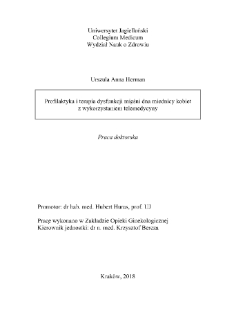Object
Title: Prevention and treatment of pelvic floor muscle dysfunction in women using telemedicine
Abstract:
Aim: The aim of the study was to create elements of the telemedical system for remote pelvic floor muscle training (PFMT) and initial assessment of it’s effectiveness among two groups of women: with symptoms of stress urinary incontinence (therapeutic training, study group I) and without symptoms (preventive training, group II tested) under remote supervision of medical personnel in comparison to the control group with symptoms of incontinence exercising without telemedicine assistance (study group III).Results: The study was conducted in a group of 31 women aged 25-41 in the period from September 2015 to December 2016. The patients were diagnosed by a gynecologist (type of incontinence, urinary tract dysfunction), assessed functionally and trained in the use of the telemedicine system. Then, they were trained for 12 weeks at home under the supervision of medical staff, who systematically analyzed the progress of exercises and gave guidance. The research involved the use of a wireless vaginal probe, connecting to the mobile application on the patient's phone and sending data from the exercises to the telemedicine portal. After remote rehabilitation with the use of telemedicine, in women from the test group with symptoms of urinary incontinence, there was a significant reduction or complete elimination of symptoms of stress urinary incontinence. Greater awareness, increased stre ; ngth, endurance and control of muscle tone were observed. All subjects were satisfied with remote exercises of pelvic floor muscles and telemedical system due to time savings and the possibility of exercising in intimate home conditions, but under the care of a specialist.Conclusions: Telemedicine solutions can facilitate access to rehabilitation for women with pelvic floor dysfunctions. Rehabilitation at home under the supervision of a specialist in women with stress urinary incontinence increases motivation, involvement in the treatment process and compliance with the recommendations. As a result, it has an effect on improving the pelvic floor muscles and eliminating problems with stress urinary incontinence.
Place of publishing:
Level of degree:
Degree discipline:
Degree grantor:
Promoter:
Date issued:
Identifier:
Call number:
Language:
Access rights:
Object collections:
Last modified:
Mar 13, 2023
In our library since:
Mar 18, 2021
Number of object content hits:
9
Number of object content views in PDF format
0
All available object's versions:
http://dl.cm-uj.krakow.pl:8080/publication/4406
Show description in RDF format:
Show description in OAI-PMH format:
| Edition name | Date |
|---|---|
| ZB-130127 | Mar 13, 2023 |
Objects
Similar
Herman, Urszula Anna
Ostrowski, Ireneusz
Effect of Dietary Behavior on the Quality of Life in Womendiagnosed with Stress Urinary Incontinence
Madetko, Renata
Jaskulski, Jarosław
Hetnał, Marcin
Stangel-Wójcikiewicz, Klaudia

